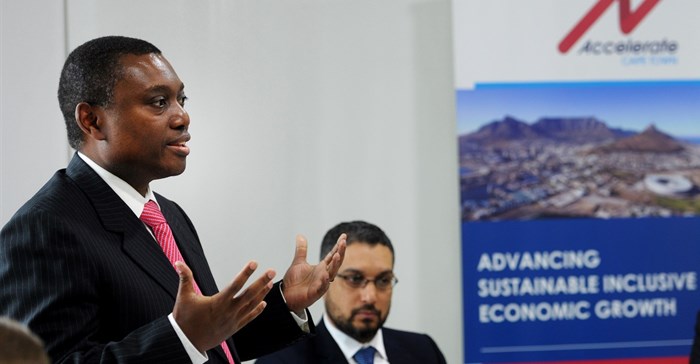The threat of a possible downgrade in June was the catalyst that brought government, business and labour together to work on the economy - we dodged that bullet - but whatever happens when the next review comes up in December shouldn't derail the structural reform required for the country's growth and prosperity.
“Irrespective of the ratings decision, current GDP growth rates require stimulus and sustained action,” says Sim Tshabalala, chief executive of Standard Bank. “We need to keep our debt-to-GDP ratio below 50%, and for action relating to growth including labour reforms for more flexibility, reviewing the economic sense of the national minimum wage, implementation of mineral and resources legislation and lastly, that the governance and balance sheets of SOEs must be turned around.”
Speaking at an Attracting Investment breakfast hosted by Accelerate Cape Town, he points out that business leaders need to become more involved in the process rather than leaving it to organised business to engage with government.
Tshabalala says the tripartite collaboration is arduous but gaining traction, and four key work streams have emerged, which are to avoid a junk status downgrade, fund and support SMEs, youth employment, and drive key investment projects in targeted industries. Focusing on the fourth work stream which includes SOEs, he says that sectors of the economy that have the greatest potential for accelerating growth and creating jobs were identified. These include:
- Education: led by ABSA, this sub-stream tackles challenges related to funding of the built environment in higher education; as well as driving collaboration between business, education authorities, and teachers’ unions to identify innovative ways of incentivising star teachers and increasing the use of ICT in schools.
- Health: led by RMB, this team is focused on improved private sector training of nurses and medical specialists.
- Pharmaceutical: also led by RMB, focus areas for this sub-stream include legislative changes to encourage local manufacture of pharmaceuticals, and discussion around the proposed NHI scheme.
- Manufacturing: led by Standard Bank, this team is fighting for better alignment of national, provincial and local infrastructure. Challenges include increasing competition from labour imports, increasing labour costs, high energy costs, and regulatory uncertainty.
- Mining: mineral and resources legislation urgently requires finalisation and is getting serious attention.
- Agriculture: led by ABSA, driving collaboration between government and private companies to identify investment opportunities that could be unblocked through funding and regulatory change, particularly given our current drought situation. There is also the urgent need to resolve uncertainty around water and property rights.
- Tourism: another initiative led by Standard Bank, some of the changes being debated here include visa free travel for business people to and from major trading partners in Africa and other emerging markets. Currently, government is considering visa on arrival for India, Russia and China.
- Governance and funding SOEs: ideas have been developed on the governance and funding of SOEs and these are currently in debate.
“There is no need for paralysis or panic. Our country is maturing at a fast rate and it is modernising. We have reforms to make and we are aware of what they are. With collaboration between business and government greater than before, I’m hopeful about what is possible,” concludes Tshabalala.

































